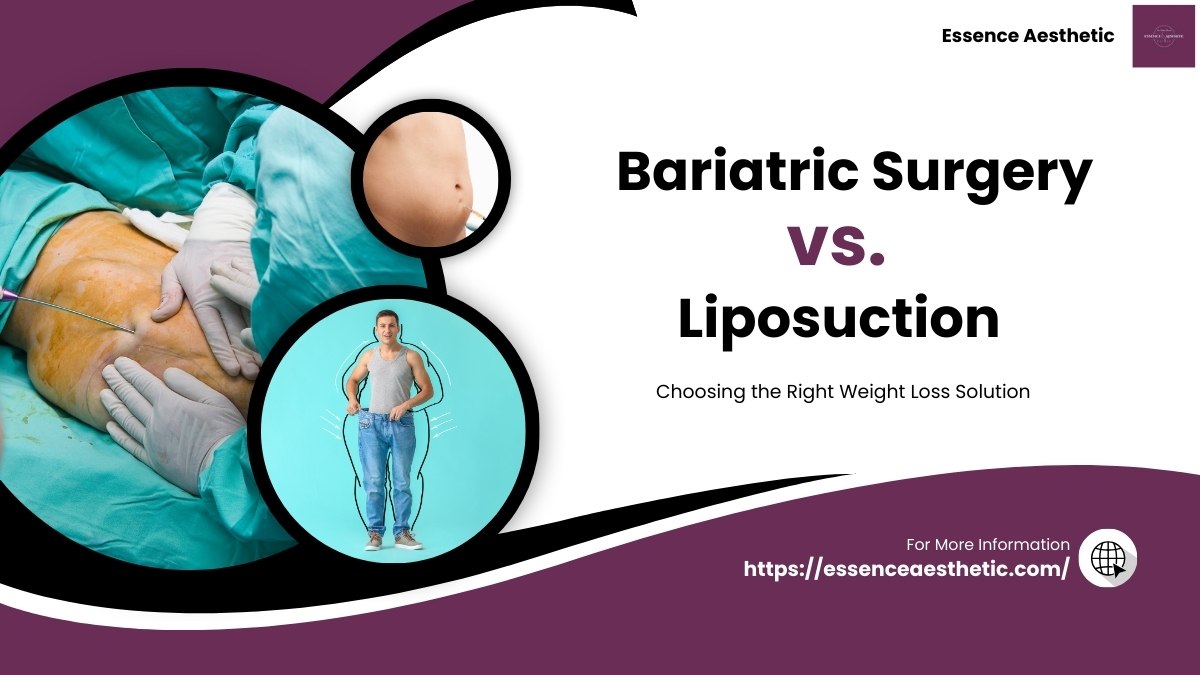The journey to reclaim your life can feel overwhelming when excess weight casts a shadow over your health and well-being. The confusion between liposuction and bariatric surgery often fuels this dilemma, given the multitude of weight loss options available to you. Both procedures involve surgical intervention, but their purpose and implications are vastly different. So, which option is the right fit for your individual needs? Let’s take a look at the world of weight loss procedures; Bariatric surgery vs. liposuction, and provide you with the knowledge to make an informed choice.
Bariatric Surgery: A major transformation to Weight Management
Imagine rewiring your internal circuitry for weight control. Bariatric surgery does just that, employing various techniques to restrict food intake or bypass portions of the digestive system, leading to significant, long-term weight loss. Think of it as a transformative tool primarily suitable for individuals grappling with severe obesity (BMI exceeding 40) or those with obesity-related health conditions like type 2 diabetes, sleep apnea, and heart disease. Different types of bariatric surgeries exist, each with its own mechanism and level of invasiveness.
Benefits of Bariatric Surgery:
- Significant weight loss: Bariatric surgery can lead to substantial and sustained weight loss, often exceeding 50% of excess body weight.
- Improved health: The surgery may significantly improve or even eliminate obesity-related illnesses, leading to better quality of life and reduced risk for premature death.
- Psychological benefits: The drastic weight reduction and improved health may increase self-esteem and confidence.
Drawbacks of Bariatric Surgery:
- Major surgery: Bariatric surgery is a complex procedure with potential risks like infection, bleeding, and nutritional deficiencies
- Long-term commitment: Post-surgical success hinges on dietary adjustments, exercise, and consistent follow-up care.
- Psychological adjustments: Adapting to changes in digestion and body image can be challenging.
Liposuction: Sculpting Stubborn Fat
Liposuction is a cosmetic procedure designed to target specific areas of fat accumulation, sculpting and contouring the body for aesthetic purposes. To address localized fat deposits resistant to diet and exercise. The main objective is to remove excess fat deposits from specific areas like the abdomen, thighs, or arms. It’s not a weight loss solution for individuals with obesity, but rather a body sculpting technique for those who are already close to their ideal weight but struggle with stubborn fat pockets.
Benefits of Liposuction:
- Improved body contour: Liposuction can effectively remove targeted fat deposits, resulting in a more sculpted and defined appearance.
- Minimal weight loss: While not intended for substantial weight loss, liposuction can lead to a few pounds of fat reduction, enhancing body contours.
- Faster recovery: Compared to bariatric surgery, liposuction is usually minimally invasive and has a shorter recovery time.
Drawbacks of Liposuction:
- Limited results: Liposuction is not a weight loss solution and cannot address obesity-related health problems.
- Costly: Liposuction can be expensive depending on the area treated and the surgeon’s expertise.
- Potential complications: As with any surgery, risks like infection, bleeding, and scarring exist.
Choosing the right solution: A Matter of Priorities
In this informative and comparative discussion on bariatric Surgery vs. liposuction, this section will stream around which procedure aligns with your weight loss motivation and respective needs. Here’s a breakdown to help you navigate this crucial decision:
Choose bariatric surgery if:
- You have a BMI exceeding 40 or 35 with obesity-related health conditions.
- You are committed to substantial, long-term lifestyle changes.
- You understand the risks and complexity of surgery.
Choose liposuction if:
- You’re at or near a healthy weight but have stubborn fat deposits.
- You’re focusing on contouring your body and improving specific areas of the body.
- You’re aware of the limitations to weight loss that this procedure imposes.
Weighing the Differences: Bariatric Surgery vs. Liposuction
Goals: Bariatric surgery prioritizes long-term weight loss and management, often leading to significant improvements in weight-related health conditions like diabetes, hypertension, and sleep apnea. Liposuction, on the other hand, is intended primarily for aesthetic purposes to contour and sculpt specific areas of the body.
Invasive nature: Compared to liposuction, which is often outpatient and involves shorter recovery times, bariatric surgery is a major operation with a longer recovery period and the potential for more serious complications.
Effectiveness: Bariatric surgery boasts a proven track record of sustained weight loss, often exceeding 50% of excess body weight. Liposuction does not address the underlying causes of weight gain and does not guarantee long-term weight control, while it is effective in removing targeted fat deposits.
Eligibility: Bariatric surgery has stricter eligibility requirements, based on BMI, health status, and commitment to lifestyle change. Liposuction offers greater flexibility in terms of eligibility, although there are certain restrictions.
Beyond the Procedures:
Navigating weight loss choices involves consulting qualified professionals, notably a cosmetic surgeon, and setting realistic expectations. A physician’s understanding of your medical history and goals is crucial. Regardless of the chosen path, sustainable success in weight management necessitates a holistic approach, combining the procedure with a healthy diet, regular exercise, and a commitment to lifestyle changes. The journey to a healthier you is personal; choose a path aligning with your goals and health by understanding key takeaways from this comparative analysis of bariatric surgery vs liposuction and their areas of application. Armed with the right information and Essence’s supportive healthcare team, make an informed decision for a healthier, happier you.

